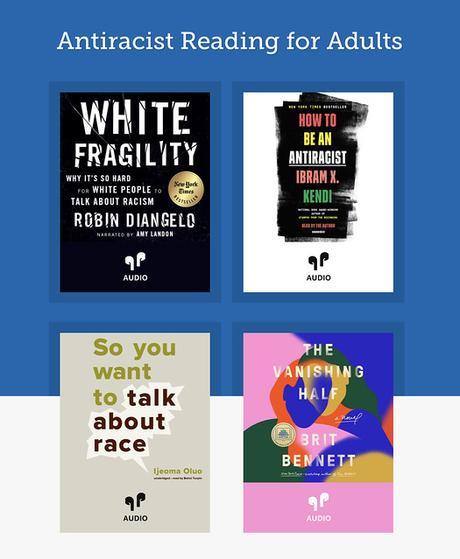
One of my many constantly-running-thoughts while reading these books has been that, "people who really need it are not going to pick it up, and people who are already on board probably won't get too much out of it."Talking about race is hard and uncomfortable. Hackles are raised, emotions are riled up, and it seems so much easier to pretend it away and to shrug off the responsibility. Even if you think you aren't actively discriminating, or that you aren't a right-wing Neo-Nazi, you still can't shrug off the reality that you are part and parcel of the problem in this radicalized society. It's tempting to balk at the notion that you are an actor in this, but the mere acceptance of our current system serves to perpetuate the systemic mistreatment and exploitation of blacks. So maybe a good place to start, as with many other issues, is to crack open some books (away from Twitter). Below are the few that I have read so far, this year:
[ Related: 3 Books & 3 Movies About Black Lives In America ]
White Fragility: Why It’s So Hard for White People to Talk About Racism
by Robin DiAngelo
Description: Referring to the defensive moves that white people make when challenged racially, white fragility is characterized by emotions such as anger, fear, and guilt and by behaviors including argumentation and silence. These behaviors, in turn, function to reinstate white racial equilibrium and prevent any meaningful cross-racial dialog. In this in-depth exploration, anti-racist educator Robin DiAngelo examines how white fragility develops, how it protects racial inequality, and what can be done to engage more constructively. (via Goodreads)I'm not sure how to review this because I think this book could be extremely helpful for white people who believe racism exists, are ready for some self-examination, and are fairly new to the discussion of white supremacy and anti-racism. However, over the last few years, I've read a lot of books and articles, watched movies and documentaries, and listened to podcasts about these issues, and so I've been exposed to a lot of DiAngelo's ideas and similar ideas. So, for me, it just wasn't all that revelatory. There were some helpful points, such as in the chapter about white tears being a distraction, but the book as a whole didn't feel necessary to me at this point in my anti-racist education.It's helpful for all of us to recognize our complicity in the system of racism and the ways we act out our own racism every day, and this book could be a good first step toward doing that. But this doesn't really address the most urgent and serious issues.
How to Be an Antiracist
by Ibram X. KendiDescription: Ibram X. Kendi's concept of antiracism reenergizes and reshapes the conversation about racial justice in America--but even more fundamentally, points us toward liberating new ways of thinking about ourselves and each other. In How to be an Antiracist, Kendi asks us to think about what an antiracist society might look like, and how we can play an active role in building it. (via Goodreads)Kendi's intervention into current race debates is to expose any assumed position of neutrality as subterfuge: there is and can be no position of 'non-racist', 'color-blind', 'post-racial', he argues: the only viable opposition to racism is to be actively and consciously antiracist. While I mostly enjoyed the interweaving of Kendi’s personal anecdotes and his own journey to becoming an antiracist because they offered a very direct and relatable example of the types of racism the author was exploring in each chapter, there were a few times where the anecdotes weren’t as concise and connected to the argument as they could have been.
A challenging but extremely worthwhile read. I struggled to keep up with all the ideas being offered but appreciate the mental workout as I continue to contemplate the reasoning and implications of Kendi's thoughts on racism.
So You Want to Talk About Race
by Ijeoma OluoDescription: In So You Want to Talk About Race, Editor at Large of The Establishment Ijeoma Oluo offers a contemporary, accessible take on the racial landscape in America, addressing head-on such issues as privilege, police brutality, intersectionality, micro-aggressions, the Black Lives Matter movement, and the "N" word. Oluo answers the questions readers don't dare ask, and explains the concepts that continue to elude everyday Americans. (via Goodreads)Ijeoma Oluo's So You Want to Talk About Race provides an extraordinarily clear and well-written argument about how we should talk about racism. "We cannot fix these systemic issues on a purely emotional basis." The school-to-prison pipeline, police brutality, predatory lending practices, and micro-aggressions are a whole host of issues that are buttressed by American institutions. Oluo manages to break them down for a specific audience: people who are willing to open themselves to a dialog about race, who are either consciously or subconsciously contributing to racism but nevertheless are aspiring for change that aligns with humanity and morality. Oluo offers cogent definitions for racism, privilege, and intersectionality that never veer to the extreme. Her interwoven personal stories transcend her own lived experience and connect to her arguments about racism at large.The Vanishing Half
by Brit BennettDescription: The Vignes twin sisters will always be identical. But after growing up together in a small, southern black community and running away at age sixteen, it's not just the shape of their daily lives that is different as adults, it's everything: their families, their communities, their racial identities. Many years later, one sister lives with her black daughter in the same southern town she once tried to escape. The other secretly passes for white, and her white husband knows nothing of her past. Still, even separated by so many miles and just as many lies, the fates of the twins remain intertwined. What will happen to the next generation, when their own daughters' storylines intersect? (via Goodreads)From the beginning I feel this book just dragged on endlessly for no reason other than to stir up some drama. I felt like there were some really interesting topics that the author wanted to bring to light, but most of the topics all stopped short of really exploring those ideas. I feel like the author played it safe with this book because she never really uncovered any of the underlying reasons or hidden truths or exposed anyone to really get to the meat of the story.There really was no plot twist, nothing to keep you captivated, just very predictable in the beginning and end. The middle had some interesting parts, but it also left out really meaty parts that could have made this book a banger. Essentially, there are no repercussions to passing for white, like there are no repercussions for white people doing what they do everyday in real life, they get to do what they want and get away with it for good, and that made this book somewhat of a long drawn out bore for me.Caste: The Origins of Our Discontents
by Isabel WilkersonDescription: The Pulitzer Prize–winning, bestselling author of The Warmth of Other Suns examines the unspoken caste system that has shaped America and shows how our lives today are still defined by a hierarchy of human divisions. In this book, Isabel Wilkerson gives us a portrait of an unseen phenomenon in America as she explores, through an immersive, deeply researched narrative and stories about real people, how America today and throughout its history has been shaped by a hidden caste system, a rigid hierarchy of human rankings. (via Goodreads)Seeing the title of "Caste" had me believe that this discussion would go beyond the binary frames that usually are associated with discourses on racism by using the lens of caste hierarchy. As the book went on, however, I found the intricate retelling of past race-related atrocities--which most of the book is dedicated to--akin to a rehashing of past work. Instead of establishing a new frame using caste, I found that on many occasions, the phrases of "dominant caste" and "subordinate caste" were just replacements for the words "white people" and "black people", and I didn't get the sense that the investigation was meant to go beyond that. Discussions of India's and the Nazi's caste systems were scant, and never really were raised to the same level of comparison as those of America's Jim Crow and Antebellum south. I found much of the book to be really unorganized, with the evidence unclear or anecdotal. The book in its totality is not bad - it serves the purpose of reminding its readers of the horrific treatment meted out to the blacks in America, over centuries. The problem is it says very little that's new, and hence, one struggles to understand why it's touted to be one of the most important books of this decade.

